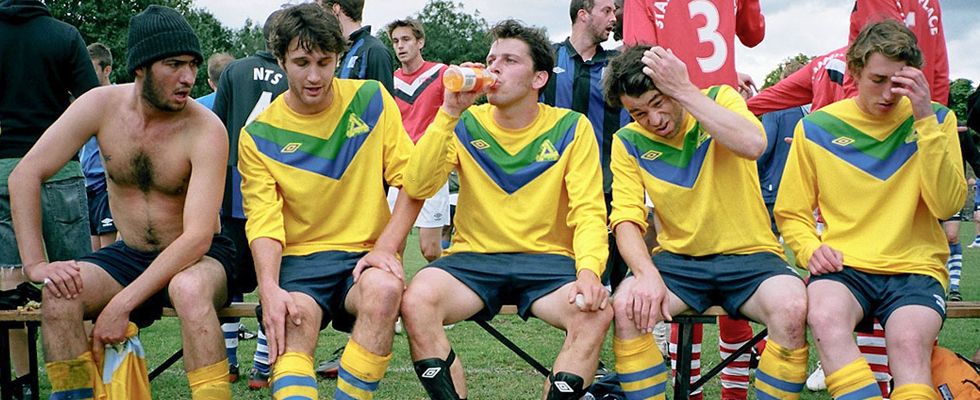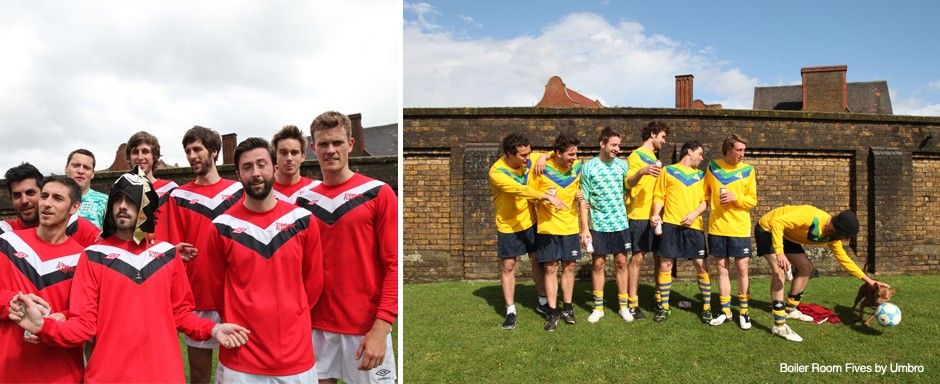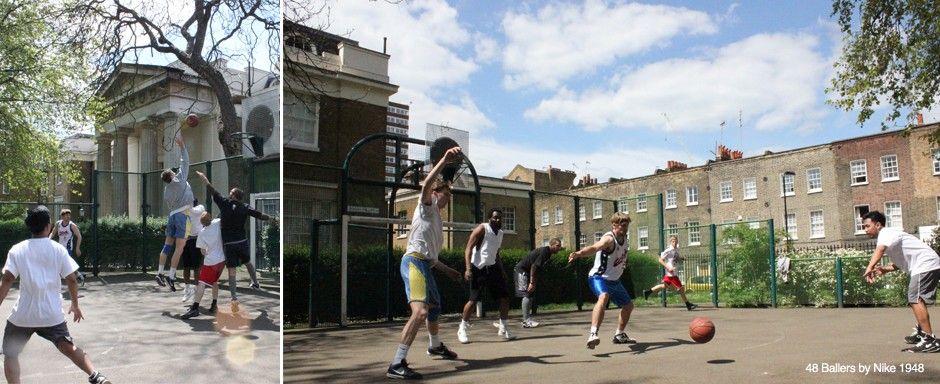Brands Play Ball
Long positioned at opposite ends of the spectrum, creative culture has finally pulled on its joggers and decided to get sporty.

There are no sign-up fees or team lists for this new breed of activity; individuals and brands need just show up and join in with the groups of like-minded folk who have decided to regularly jog, work out, or play ball together. The growing movement, largely spearheaded by those exhausted by the ‘always on’ nature of their working lives, has seen the establishment of community-led sporting groups. Its proponents are a mix of enthusiasts looking to offset the nine-to-five, trendsetters tapping into new social networks, and locals attracted by the convenience and ‘no strings’ introduction of physical activity into their day-to-day lives.
Forward-thinking companies are on-board too, many launching campaigns to encourage ongoing local and social community activity in key urban areas. This doesn’t mean sponsoring a standout athlete, or a team, but providing the infrastructure for whole communities to play on their own terms.
With the London Olympics underway and East London, in particular, galvanised by the global focus, certain brands are staying front-of-mind by fusing physical activity with culture both in the U.K. and abroad – ultimately encouraging local, social and health benefits that are good for everyone.
In prime position to leverage the hype surrounding London 2012 is Nike 1948, a space in East London where sport meets culture. While its existence is no big secret, the 1948 environment is certainly leading the sector.

Brands are staying front-of-mind by fusing physical activity with culture both in the U.K. and abroad – ultimately encouraging local, social and health benefits that are good for everyone. 'Nike 1948 is designed to allow communities to make use of the space and for Nike to inspire Londoners to play and love sport via cultural experiences, installations, screenings and events,' explains Ryan Greenwood, head of PR and communications at Nike U.K. and Ireland. 'The aim of the project is to reach different levels of the creative community by engaging them through sport. We have six sports clubs at 1948 and they’re all made up of local creatives.'
From the ‘48 Ballers’ (basketball) to ‘Yoga Flex’ (you guessed it), Nike 1948’s six clubs tap into different levels of community sporting culture. It doesn’t stop there. Nike 1948 is currently regenerating a local public sports space called Aske Gardens, with the aim of making it better for the entire community to use; the consultation process is conducted in the 1948 space.
Also playing in the community-led arena before the Olympics is Umbro. Over the past year the brand has teamed up with London underground music night Boiler Room to host five-aside football matches in an East London park. Under the banner ‘Boiler Room Football Club, tailored by Umbro’ the collaboration facilitates weekly kickabouts, calling on local people, labels and collectives such as NTS Radio, R&S Records and Young Turks to play ball. 'Football, music, food, drink, sun and a lot of rain,' the BRFC’s mission statement reads. 'Less about inter-label club rivalries and more a coming together to play football, talk football and watch football.' This is a social club – not a serious competition, and by facilitating the process Umbro has established a friendly rapport with a talented creative community, while further cementing its local reputation as a dedicated advocate of the game.
'Sport is deeply communal and tribal, so any platform that can facilitate it happening will benefit with the energy that’s associated with it,' says Nick Crocker, founder of Sessions, a personal health-coaching program in the U.S. and a former digital strategist. 'Sedentary lives are now legitimately a chronic condition that affect millions of people.' Branded or no, Crocker regards the implied health benefits of ongoing sporting activity as overwhelmingly positive. He cites Nike+ as leading the trend towards community-led sport in the States, but also sees opportunity for brands to come on board as supporters of grass-root events. For example, Parkrun is a weekly, five-kilometre untimed run in Bushy Park, Teddington, that’s open to all ages and abilities, while the New York Bridge Runners holds weekly jogs from The Bowery in Manhattan.

Sport is deeply communal and tribal, any platform that facilitates it happening will benefit with the energy that’s associated with it. Social media and app technology is also helping people switch off and shape up. Recess is a brilliant app and sport-centric social networking tool developed by Brooklyn-based Interactive Designer Cooper Smith as part of his MFA thesis. Put simply, it helps over- worked nine-to-fivers create and facilitate some much- needed after-hours sporting activity.
There seems to be a lot of activity in this sector, but why now? Crocker pinpoints three things: 'Convergence of health being a massive problem, tech enabling people to facilitate online interactions that power offline experiences, and the immediate reward that sport brings,' he states.
Progressive developments in this sector are by no means confined to the West. In Shanghai, the Dark Runner Club (founded by CHairYUAN, an eyewear designer) conducts running sessions under cloak- and-dagger darkness. Encouraged by the film Crank, where the main character must keep his adrenaline high to stay alive, an energy-filled CHairYUAN and a mate discovered the cool thrill of pounding the pavement at night. Friends soon joined and Nike came knocking. 'At the beginning it started off as just friends,' CHairYUAN explains. 'Since then we’ve developed a big following on Weibo, so a lot of people come through from there. Then word of mouth spread as we became more popular. Nike often support us with product and inviting us to events.' CHairYUAN’s official Dark Runner site lets enthusiasts know about upcoming runs and offers them mixtapes. It also features information on cool running products, most of it Nike.
Even the static pages of independent magazines are starting to show a sporting bias. Out of Japan, Corner magazine is a beautifully compiled ‘journal of a runner’s lifestyle’ that examines the creative culture surrounding runners the world over, including where they live, what they eat and the art they collect.
'Community sport is important because we revel in team spirit,' says Nike 1948’s Ryan Greenwood. 'People want to feel part of something bigger and group sports help you find your identity.'
It seems that now – more than ever – is the time for brands to team up with sporting hobbyist groups, facilitate active experiences, or support spaces where community-led sport can take place. The playing field isn’t too crowded; there’s still a lot of room to move.


